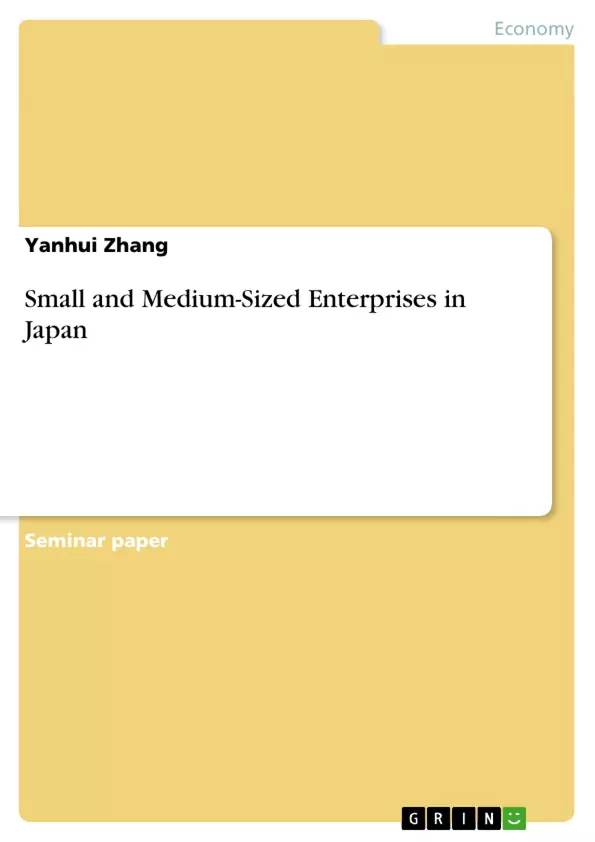Japan is the second largest industry nation in the world. At the end of World War II Japan was in ruins and lagged far behind the industrialized and experienced western nations. However, it has managed to compete against almost all other countries in relatively short time without any appreciable help. The small and medium-sized enterprises (SMEs) as the main corporation form have played a crucial role for the country’s miracle and development of the modern economy after the war, as large companies were all destroyed, people have lost their livelihood and world markets were shrinkage. Today, the small and medium-sized enterprises are still serving as the driving and dominant force for the domestic economy. According to JETRO (2002), the total number of small and medium-sized enterprises in Japan are 6.51 million, which represent 99.1 % of the total businesses (excluding primary industry); SMEs’ contribution amounts to 81% of the total employment (excluding employment in the prime industries), 51.7% of the total shipment of manufacturing industry, 61% of the total sale in the whole sale and 78% in the retail. Clearly, the growth of the Japanese SMEs depends on several success factors, such as technologies, marketing skills, capital funds and effective resource management in the last four decades (Ohmea, 1982). However, some western countries like U.K. and France were using the same development strategy as Japan after the World War II, and their economies still declined dramatically competing with Japan. Therefore, there must be some special influential factors in the Japanese companies that are totally different from western models. This paper focuses mainly on the socio-cultural development of SMEs in Japan with typical Japanese characteristics and analyses the influential yet distinguishing success factors and their implications for the Japanese SMEs. The paper will further approach the socio-cultural disadvantages of the existing systems and the government roll for Japanese SMEs and draw conclusion in the last section.
Inhaltsverzeichnis (Table of Contents)
- Introduction
- Research Issues and Implications for the Small and Medium-sized Business Sector in Japan
- Socio-cultural Success Factors for Japanese SMEs
- Concept of the Corporation
- The PRIMA (People and Relationship Issues in Management)
- Education
- Socio-cultural Disadvantages of the Japanese SMEs
- Socio-cultural Success Factors for Japanese SMEs
- SMEs Promotion Policies and the Government Roll
- Conclusion
Zielsetzung und Themenschwerpunkte (Objectives and Key Themes)
This paper aims to explore the socio-cultural development of Small and Medium-sized Enterprises (SMEs) in Japan, analyzing their unique characteristics and distinguishing success factors. It further examines the socio-cultural disadvantages of the existing systems and the role of the government in supporting Japanese SMEs.
- The concept of the corporation in Japanese SMEs
- The importance of people and relationships in Japanese management
- The influence of Japanese cultural values on SME success
- The role of government policies in promoting SMEs
- The socio-cultural disadvantages faced by Japanese SMEs
Zusammenfassung der Kapitel (Chapter Summaries)
- Introduction: This chapter provides an overview of the significance of SMEs in the Japanese economy and introduces the socio-cultural approach adopted in the paper.
- Research Issues and Implications for the Small and Medium-sized Business Sector in Japan: This chapter explores the socio-cultural success factors for Japanese SMEs, focusing on the concept of the corporation, the importance of people and relationships in management, and the role of education in shaping the workforce. It also discusses the socio-cultural disadvantages faced by Japanese SMEs.
Schlüsselwörter (Keywords)
Key terms and concepts explored in this work include Japanese SMEs, socio-cultural factors, corporation concept, PRIMA (People and Relationship Issues in Management), education, government policies, success factors, disadvantages, and the role of cultural values in business.
Frequently Asked Questions
What is the role of SMEs in the Japanese economy?
Small and medium-sized enterprises (SMEs) represent 99.1% of all businesses in Japan and contribute to over 80% of total employment, serving as the driving force of the domestic economy.
What are the socio-cultural success factors for Japanese SMEs?
Key success factors include a unique concept of the corporation, the importance of relationships in management (PRIMA), and a highly valued education system.
What does PRIMA stand for in Japanese management?
PRIMA stands for People and Relationship Issues in Management, highlighting the cultural emphasis on harmony and long-term connections within Japanese businesses.
How did Japanese SMEs contribute to the "post-war miracle"?
After large companies were destroyed in WWII, SMEs helped rebuild the economy by providing livelihoods and developing modern manufacturing through effective resource management.
What are some socio-cultural disadvantages for SMEs in Japan?
Disadvantages can include rigid hierarchies, high pressure for conformity, and difficulties for smaller firms to compete with large conglomerates (Keiretsu) for talent and resources.
- Arbeit zitieren
- Yanhui Zhang (Autor:in), 2003, Small and Medium-Sized Enterprises in Japan, München, GRIN Verlag, https://www.grin.com/document/39038



